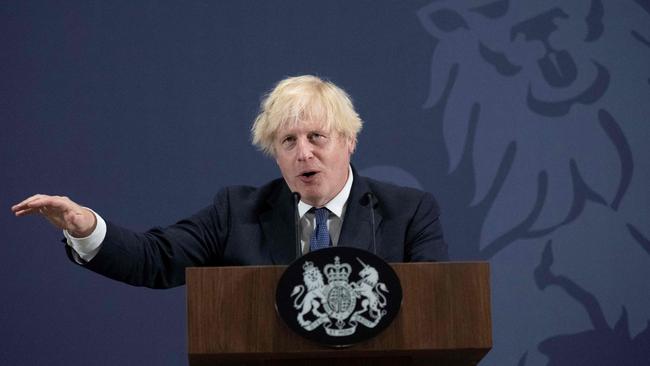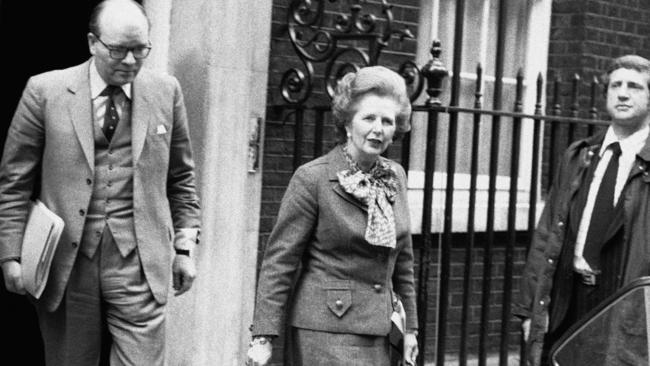Momentous Freedom Day decision could finish off Boris Johnson

Did the big easing-up that took place in England on Monday aim too high, too far, too soon? His parliamentary party, like hers at the time, keeps a finger aloft for any change in the wind of Johnson’s fortunes. This most self-aware of prime ministers is very aware indeed of the stakes.

Thatcher, too, knew the gamble she was taking. It could all have gone so wrong. I remember the awful atmosphere in the Commons when HMS Sheffield was sunk. Like Johnson, she was not “following the science” – a military science that was divided, with many experts sceptical, even scornful, and her own defence secretary doubtful and teetering. Her leadership was insecure, and if we’d lost she’d have been finished. Fleet Street, bellowing their support, would have switched overnight to blistering attacks on a government that had been “criminally negligent” in not foreseeing danger and acting earlier against Galtieri.
Johnson, I believe, will this weekend be feeling something of her anxiety. Just as we, Thatcher’s MPs, watched shakily for every report of casualties, this morning Johnson will be looking at the graph of new coronavirus cases, hoping against hope that the recent slackening in the rise may be sustained. If not, then in a two-to-three-week delayed reaction, will new hospitalisations follow new cases with the automaticity that most of the experts predict? And if they do, will new deaths follow new hospitalisations with the same automaticity?
On Monday he chose to throw a very big switch, and put in train events no prime minister can control. He did so in the face of much doubt and some outright opposition from experts in epidemiology and medicine. Even his own chief scientific advisers have been visibly nervous passengers on his shopping trolley.

For make no mistake, the trolley is his, its direction his, and there will be no deflecting blame if it ends in disaster. I don’t buy the widely-held view that Johnson is just a wobbly opportunist. He is – it’s true – short on plans, details, doctrine. “Johnsonism” doesn’t work as a term. But “Johnsonian” does. He has evident instincts, strong ones. Our prime minister is instinctively against governments bossing people around, and instinctively in favour of letting things take their course. He does believe in freedom, however scattily defined.
Such instincts held him back from a more immediate lockdown than the one he finally conceded on March 23 last year. There’s a belief (I’m not equipped to judge it) that this was too late and cost many lives. The same instincts held him back from the “circuit-breaker” lockdowns that were proposed after restrictions had been relaxed last summer and cases began to rise again. Again, some believe this cost lives. Again, the same instincts deterred him from stopping all household mixing over Christmas, a decision that many believe cost more lives.
I’m sure too these were the instincts that discouraged him from sacking Dominic Cummings after his adviser’s Barnard Castle truancy; and from sacking his health secretary when evidence of Matt Hancock’s extramarital affair broke. “Leave it be": there’s a clear pattern here, and while the pattern hardly amounts to a serious strategy for government, I don’t think it’s right to call it (as some do) vacillation. Waffle and burble as Johnson may, lurch and stumble around as he may, we can still observe an obstinate will and a presiding mind at work: a disposition pulling steadily in one direction. When the world cries “something must be done!” Johnson’s instinctive response is “steady on, things often sort themselves out on their own”. In that sense, and however different an impression may have arisen, this prime minister has a clear political compass, and acts on it.
The problem for Johnson, though, is that, so far, after every assertion of his instinct to leave the reins loose or loosen them, it has been easy to conclude that this has killed people. There’s a lesson here (his critics think) just waiting to be made clear.
And so to Monday. His hands-off instinct struck again. We proceeded with “Freedom Day” despite soaring infection rates and rising hospitalisations. It’s true that some restrictions remain in place, that the curse of the ping has not (yet) been lifted, and mask-wearing may continue for a while, but Monday was still a very big day. I have no idea how it will end and nor do you, but I do know this: if it ends badly, with deaths soaring and an NHS staring again at disaster, then that will finish Boris Johnson.
His backbenchers, few of them admirers, will stop whispering and begin to whistle. Colleagues will start eyeing up new and future sources of preferment. Those scientific experts who’ve been containing their doubts will start spilling them. And the media commentariat will be dusting off shroud-waving columns already half-written in their minds. “Three times,” they will write, “science told him to crack down. Three times he stayed his hand. Now he has done it again, and once too often.”
Be in no doubt that Johnson knows that. There’s one side of our PM that the world understands very well: the image he trades under, the jaunty, careless, blithe, boosterish Boris, the Boris who thinks it will all be right on the night. It’s certainly part of him. But his yang carries its own yin. There’s a fearfulness there beneath the surface, an underlying gloom, and the classicist’s nagging understanding that nemesis waits in watchful attendance upon hubris. In defiance of all appearances, I’m sure Johnson lives in a state of constant anxiety that he has tempted fate too far, and everything is about to go horribly wrong.
That horror will be very close to the surface for him this weekend, matched only by his flickering conviction that he is a god, and nothing and nobody shall harm him. He gambles like a god, then trembles like one cursed by the gods.
His premiership will live or die by the decision he has just taken. I think it is the right one, that he understands the risks, and that this is brave. If it goes wrong we shall certainly be merciless. If it goes right then he will deserve admiration.



This week’s “Freedom Day” was Boris Johnson’s Falklands. I say that fully aware of all the ways it wasn’t. No war looms and Covid-19 is not Leopoldo Galtieri. But parallels remain that Johnson must surely recognise. Like Margaret Thatcher he spits in the face of caution and has listened to well-informed doubt, and overruled it. Like her he’s very susceptible to being proved wrong – or right. And the world, he knows as well as she did, is watching.